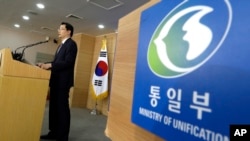SEOUL —
South Korea is reacting positively to a surprise offer from the North for talks on a wide range of issues. This marks a significant reversal of tensions on the peninsula, which had been at their highest state in decades.
South Korea's Unification Ministry says Seoul "positively accepts" Pyongyang's proposal for working-level talks.
Spokesman Kim Hyung-Seok tells reporters this will be an opportunity to build trust between the two Koreas and that details relating to the date and agenda will be announced later.
North Korea's surprise offer of talks was issued in the name of the Committee for the Peaceful Reunification of the Fatherland. It came in a special announcement aired shortly after 12 noon (Thursday) on North Korean radio and television.
The North Korean announcer says the North proposes holding talks about normalizing the operation in the Kaesong Industrial Zone and resuming tours to Mt. Kumgang. Humanitarian issues, such as the reunion of separated families and their relatives, can also be discussed during the talks, if necessary.
The announcer adds that Pyongyang will allow Seoul to set the place and date of the meeting.
The Kaesong industrial complex, just north of the border, ceased operations in April, when North Korea pulled its 43,000 factory workers from the complex.
Seoul has already offered working-level talks, but only to discuss allowing the managers of the more than 100 South Korean factories in the zone to be able to retrieve raw materials and finished goods left behind after they pulled out.
The Kumgang mountain tourism resort, another rare inter-Korean cooperative venture, also generated millions of dollars worth of revenue for the communist government. Three years ago, the North seized the assets of the South Korean government and private entities at the resort. It expelled the South Korean workers who had remained behind to maintain hotels and restaurants following a 2008 incident in which a South Korean was shot dead by a North Korean soldier near the resort.
The North's relatively flexible offer of talks about the halted projects is seen as a significant reversal after recent months of bellicose rhetoric.
Pyongyang had threatened to launch a nuclear war - a threat not taken very seriously by Seoul or Washington. It also declared the 1953 Korean War armistice to be void and vowed to continue pursuing its development of nuclear weapons and ballistic missiles in defiance of international sanctions.
The offer of talks from Pyongyang was made just after South Korean President Park Geun-hye gave a Memorial Day speech that contained remarks directed at the North.
President Park says "North Korea must give up its policies that are fueling its isolation and backwardness and bravely accept the hand of reconciliation being offered by South Korea and the global community and strive for mutual prosperity."
The two Koreas have never established diplomatic relations nor signed a peace treaty.
(( SIGNED))
South Korea's Unification Ministry says Seoul "positively accepts" Pyongyang's proposal for working-level talks.
Spokesman Kim Hyung-Seok tells reporters this will be an opportunity to build trust between the two Koreas and that details relating to the date and agenda will be announced later.
North Korea's surprise offer of talks was issued in the name of the Committee for the Peaceful Reunification of the Fatherland. It came in a special announcement aired shortly after 12 noon (Thursday) on North Korean radio and television.
The North Korean announcer says the North proposes holding talks about normalizing the operation in the Kaesong Industrial Zone and resuming tours to Mt. Kumgang. Humanitarian issues, such as the reunion of separated families and their relatives, can also be discussed during the talks, if necessary.
The announcer adds that Pyongyang will allow Seoul to set the place and date of the meeting.
The Kaesong industrial complex, just north of the border, ceased operations in April, when North Korea pulled its 43,000 factory workers from the complex.
Seoul has already offered working-level talks, but only to discuss allowing the managers of the more than 100 South Korean factories in the zone to be able to retrieve raw materials and finished goods left behind after they pulled out.
The Kumgang mountain tourism resort, another rare inter-Korean cooperative venture, also generated millions of dollars worth of revenue for the communist government. Three years ago, the North seized the assets of the South Korean government and private entities at the resort. It expelled the South Korean workers who had remained behind to maintain hotels and restaurants following a 2008 incident in which a South Korean was shot dead by a North Korean soldier near the resort.
The North's relatively flexible offer of talks about the halted projects is seen as a significant reversal after recent months of bellicose rhetoric.
Pyongyang had threatened to launch a nuclear war - a threat not taken very seriously by Seoul or Washington. It also declared the 1953 Korean War armistice to be void and vowed to continue pursuing its development of nuclear weapons and ballistic missiles in defiance of international sanctions.
The offer of talks from Pyongyang was made just after South Korean President Park Geun-hye gave a Memorial Day speech that contained remarks directed at the North.
President Park says "North Korea must give up its policies that are fueling its isolation and backwardness and bravely accept the hand of reconciliation being offered by South Korea and the global community and strive for mutual prosperity."
The two Koreas have never established diplomatic relations nor signed a peace treaty.
(( SIGNED))





